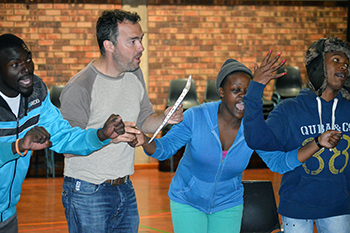Latest News Archive
Please select Category, Year, and then Month to display items
10 March 2022
|
Story Anthony Mthembu
|
Photo Unsplash
 The No Student Hungry team gearing up to start distributing food parcels to the selected students.
The No Student Hungry team gearing up to start distributing food parcels to the selected students.
The UFS is one of the many institutions of higher learning where food insecurity is an active issue. However, the
No Student Hungry Programme is one of the initiatives launched at the university to assist in fighting food insecurity at the institution.
The purpose of the programme
Since its inception in 2011, the initiative has assisted many students in acquiring a healthy meal. Additionally, the Food Environment Office also hands out food packages, so that students can continue to achieve academically. “We are trying to develop a healthy environment for students and make it easier for them to have a nice and healthy meal,” stated Annelize Visagie, who heads the Food Environment Office at the UFS. The Food Environment programme is spread out on all three campuses, each with its own facilitators. Furthermore, the programme mainly caters for students who are not funded by the National Student Financial Aid Scheme (NSFAS) but who are excelling academically. The abovementioned students apply for assistance online, and a list is then drawn up of students who receive assistance for the year.
Alternative solutions to keep the initiative running
On the Bloemfontein Campus, the No Student Hungry Programme will be catering for 200 students in the 2022 academic year, assisting them with a daily nutritious meal. Additional food parcels are also handed out to provide further assistance. “We give food parcels to the students on the list every Tuesday and Thursday at the Thakaneng Bridge,” Visagie highlighted. However, she argues that catering for the student population through this programme can be a challenge, as the demand for assistance is growing rapidly and the ability to assist is limited. The programme relies on partnerships and sponsors to assist the student body. In fact, the coordinators of the programme currently have a memorandum of understanding with Tiger Brands according to which they deliver around 100 food parcels for distribution.
In addition, the coordinators have put in place alternative measures to ensure that they can provide more food to students. “The
Kovsie Act Office, in partnership with the
Department of Sustainable Food Systems and Development, has started a food garden where healthy and nutritious produce are grown, in order to add value to the distribution,” she indicated. Although the programme can only assist to a point, students who are in desperate need of assistance are never turned away. In fact, the
Social Support Unit at Thakaneng Bridge usually assists students with food vouchers for a maximum of four days.
A commitment to teaching healthy eating habits
The programme is not only committed to curbing food insecurity, but also to ensuring that students have a healthy and balanced diet. As such, a booklet is being issued by the
Department of Nutrition and Dietetics in collaboration with the Department of Sustainable Food Systems and Development, which contains ways in which students can make a healthy meal using some of the ingredients offered in the food parcels.
“We want to teach students how to eat healthy in the cheapest way, because they don’t have a lot of money to buy expensive food products,” Visagie argued.
I-DENT-I-TIES to shine at the Free State Arts Festival
2016-07-08

Erwin Maas with members of the student cast from the
Qwaqwa Campus. They are, from left: Mpho Xaba,
Lebohang Molefe and Tankiso Mofokeng.
Imagine this: A student cast from a rural campus; Production team consisting of a New York-based Dutch director, a South African screen and stage legend, a The Hague/Vienna-based Dutch theatre designer, and a Vienna-based Serbian performance-craft-artist and designer.
This sounds like a far-fetched flight of the imagination. But it is real and it is called ‘I-DENT-I-TIES’, a large-scale interdisciplinary performance project with international theatre professionals and students from the University of the Free State’s (UFS) Qwaqwa Campus.
According to the director of the project, Erwin Maas, the production explores the ‘dents’ and ‘ties’ of both individual and communal identification and distinctiveness and does this through the famous Basotho story of ‘Moshanyana Sankatana’ as a point of departure.
“We explore questions like ‘what are dents in our society as well as in ourselves’, ‘what ties me to who I really am and who I want to be’, ‘what does it mean to be me’, ‘what does it mean to be South African’,” said Maas, who has been working on this project since last year.
The production also celebrates personal, communal, and universal narratives and identities through song, dance, story-telling, and music. It explores the past, the present, and the future.
“This production will certainly reveal an extraordinary journey into what makes us unique and binds us together,” he added during the rehearsals that started in May at the Qwaqwa Campus.
Maas has teamed up with a well-known South African film and stage legend, Jerry Mofokeng, as consultant. Mofokeng, who introduced Maas to the ‘Sankatana’ story, has featured on a number of critically-acclaimed films that include ‘Cry, The Beloved Country’ as well as the Academy Award-winning ‘Tsotsi’. Maas has also worked with the Hague/Vienna-based Dutch designer Nico de Rooij and Djana Covic, a Vienna-based Serbian designer.
The production is a partnership between the UFS Student Affairs, Vrystaat Arts Festival, the Programme for Innovation in Artform Development, and the Kingdom of the Netherlands in South Africa. It will premiere at the Free State Arts Festival, held in Bloemfontein from 11 to 16 July 2016. This will be followed by a performance at the Qwaqwa Campus on 19 July 2016.